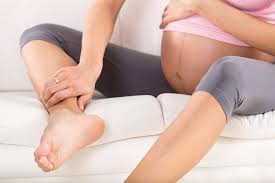Almost all pregnant women experience swelling that occurs during pregnancy. This is a common occurrence and happens because a woman’s pregnant body increases fluids and blood by up to 50% to accommodate the growing foetus.
In addition to swollen ankles, during pregnancy you can also experience swelling in the hands, feet, legs and face. It varies with the time of day and also the temperature affects it.
When and Why Do Swollen Ankles Happen During Pregnancy?

The growing baby in your womb causes many changes in your body. Chemical changes in the blood cause fluid redistribution into your tissues. By the last trimester, the weight of the baby in your uterus can place pressure on your pelvic area and the vena cava, which is a major blood vessel returning blood from the lower half of the body to the heart. This may cause blood to accumulate below the knees, causing swollen ankles during pregnancy.
An increase in body weight may also cause feet that are larger than normal, especially if the weight gain was rapid and substantial. Women with extra amniotic fluid or carrying more than one baby can experience this swelling even more severely.
The following factors can also worsen the swelling:
- Spending too much time on your feet
- Excessive daily activity
- Low potassium levels
- Excessive coffee or salt intake
During the first few days after childbirth, you may find yourself sweating and urinating excessively. This is your body’s way of getting rid of the extra fluids accumulated during pregnancy.
When to Worry
Swollen ankles during pregnancy are not experienced by all pregnant women. Almost 1 in 4 women experience no swelling during any stage of their pregnancy. Most women will experience varying degrees of swelling and it is perfectly normal.
However, do seek medical attention when:
- The swelling moves from your ankle upwards to your calf and leaves an indentation when pressed.
- You experience a sudden and severe swelling in your face, feet or hands especially in the third trimester. This could be an indication of a condition called pre-eclampsia.
- Only one leg is affected and is accompanied by a tender, red and lumpy calf. This could indicate a deep vein thrombosis (blood clot in the vein).
How to Deal With Swollen Ankles During Pregnancy
Follow the tips below to minimise swollen ankles:
- Defeat gravity by sitting with your feet up. Circle your ankles occasionally. Avoid standing for extended periods.
- Sleeping on your left side removes pressure off the inferior vena cava. Try to elevate the legs at a gentle angle with pillows.
- Use compression stockings to prevent the blood from pooling in your ankles. These special stockings force circulating blood through narrower channels by compressing the surface veins, arteries and muscles. This leads to an increased arterial pressure which causes more blood back to the heart and less pooling in the ankles.
- Daily gentle exercise like swimming and walking will keep the blood flowing optimally.
- Keep cool by applying cold compresses to the affected areas.
- Walking and standing in a pool is thought to gently compress the legs and ankles which may decrease the swelling.
- Gentle foot massage may also help with the blood circulation in those areas.
There are a few complementary therapies you could try to ease the swelling:
- Aromatherapy: the use of essential oils like lavender, chamomile and cypress oils may help ease the swollen ankles during pregnancy. You can either soak your feet in warm water and add in a few drops of essential oil, or massage your legs and ankles gently in an upwards motion using both hands. Remember to use a carrier oil like grapeseed oil with only 1-2 drops of essential oil. This may be painful if the swelling is excessive and the skin pulled tight.
- Herbal remedies: herbal teas like dandelion tea can help ease fluid retention when taken in moderation.
- Osteopathy: use a licensed chiropractor or osteopath to realign your skeleton. This may ease any stress and tension in your body caused by the growing baby.
- Reflexology: it is believed that gentle massage on your feet will provide relaxation and ease the swelling. Be sure to use a licensed reflexologist who has experience practicing on pregnant women.
Can I Prevent Swollen Ankles During Pregnancy?
Your body undergoes major changes during pregnancy. While those changes are unavoidable, there are steps you can take to minimise the swollen ankles.
- Consume less caffeine: even though caffeine increases urination, it actually triggers your body to hold onto fluids to prevent dehydration.
- Limit your salt intake: excessive salt intake will encourage fluid retention. Keep your salt intake just rightis necessary for the optimum functioning of your body.Remember to read the food labels on processed foods you consume. Salt lurks everywhere!
- Comfortable shoes may not be aesthetically appealing to you right now, but reducing leg and back pain should be your priority during pregnancy. At home wear soft, rubber soled shoes to keep you safe and comfortable.
